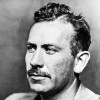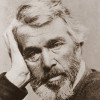“ All that a man does is physiognomical of him. You may see how a man would fight, by the way in which he sings; his courage, or want of courage, is visible in the word he utters, in the opinion he has formed, no less than in the stroke he strikes. He is one; and preaches the same Self abroad in all these ways. Without hands a man might have feet, and could still walk ”
Thomas Carlyle, On Heroes, Hero-Worship, and The Heroic in History (1841). copy citation
| Author | Thomas Carlyle |
|---|---|
| Source | On Heroes, Hero-Worship, and The Heroic in History |
| Topic | courage opinion |
| Date | 1841 |
| Language | English |
| Reference | |
| Note | |
| Weblink | http://www.gutenberg.org/files/1091/1091-h/1091-h.htm |
Context
“that what we call imagination, fancy, understanding, and so forth, are but different figures of the same Power of Insight, all indissolubly connected with each other, physiognomically related; that if we knew one of them, we might know all of them. Morality itself, what we call the moral quality of a man, what is this but another side of the one vital Force whereby he is and works? All that a man does is physiognomical of him. You may see how a man would fight, by the way in which he sings; his courage, or want of courage, is visible in the word he utters, in the opinion he has formed, no less than in the stroke he strikes. He is one; and preaches the same Self abroad in all these ways.
Without hands a man might have feet, and could still walk: but, consider it,—without morality, intellect were impossible for him; a thoroughly immoral man could not know anything at all! To know a thing, what we can call knowing, a man must first love the thing, sympathize with it:”
source



